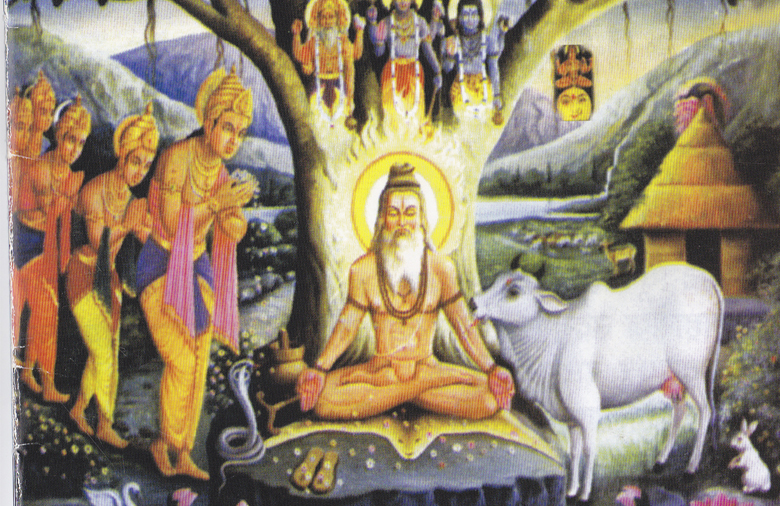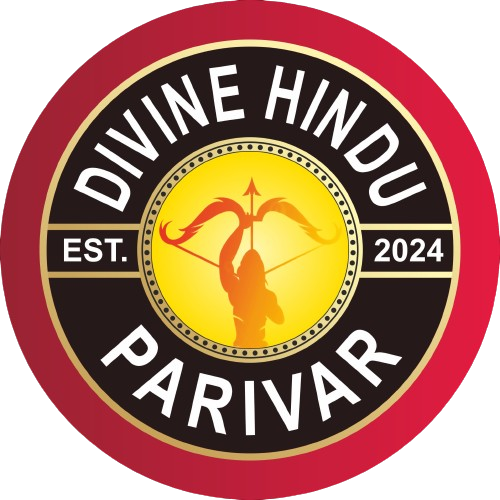
Dadhichi, also spelled Dadhyanch or Dadhichi, is a figure in Hindu mythology known for his sacrifice and contribution to the gods. His story is often cited as an example of selflessness and devotion. Here are key points about Dadhichi:
- Sage Dadhichi: Dadhichi was a sage known for his great penance and knowledge. He was revered for his wisdom and ascetic practices.
- Sacrifice for the Gods: In a significant episode from Hindu mythology, the gods faced a formidable demon named Vritra who had become nearly invincible due to a boon. The gods realized that they needed a powerful weapon, the Vajra (thunderbolt), to defeat Vritra.
- Creation of Vajra: However, the gods also knew that the only material suitable for creating the Vajra was the spine (vertebrae) of a sage. Understanding the gravity of the situation and the need to defeat the demon, Dadhichi willingly decided to sacrifice his own life for the greater good.
- Self-Sacrifice: Dadhichi performed a selfless act of sacrificing his body, allowing the gods to use his spine to create the powerful weapon. This act demonstrated his supreme devotion to the welfare of the universe.
- Defeat of Vritra: With the Vajra created from Dadhichi’s spine, the gods, led by Lord Indra, successfully defeated the demon Vritra and restored balance to the cosmos.
- Admiration by the Gods: The gods were deeply moved by Dadhichi’s sacrifice and admired his selflessness. They revered him for his devotion and honored his memory.
- Other References: Dadhichi’s story is mentioned in various Puranas (ancient Hindu scriptures) and epics like the Mahabharata. His sacrifice is often cited as an example of the importance of selfless actions and putting the welfare of others above one’s personal interests.
Dadhichi’s story is celebrated in Hindu mythology as an embodiment of sacrifice and devotion to the greater good. His selfless act in providing his own body for the creation of a weapon to protect the cosmos is a poignant and revered episode in Hindu lore.
Dadhichi, also known as Dadhyancha, is an important character in Hindu Mythology. He is revered amongst the greatest of sages and is portrayed as an example that no sacrifice is too great when the result is the good of the world.Dadhichi is corrupt form of dadhyanch/dadhyang, and it is derived from “dhadhya” means curd in Sanskrit as pointed out by great Sanskrit scholar Panini himself.Dhadya+ang means body takes strength from curd. He was among one of the greatest among clan of bhrigus. He is credited with giving up his life in order to allow the Devas to use his bones to make weapons to defeat the Asura Vritra.
Biography
Dadhichi was the son of Atharvan a rishi and his wife Chitti(Bhaagvat Puraan, 4/1), who was the son of Brahma .Chitti was sage kardam daughter. His wife’s name was Swarcha (or other) mentioned at few places and his son was Pippalada, a great sage himself, who is supposed to be associated with the Pippalada school of thought and associated with the origin of the Praśna Upanishad.He had established his ashram in Misrikh, in Namishyaranya near Lucknow, in the state of Uttar Pradesh, India[1].Namishyaranya has been cited in all of the puranas as the place of his ashram, where it is still in existence. His name is seen to occur in the 1st mandala of Rigveda, Bhagavata Purana, Srimad Devi Bhagavatam and in the Puranas). He is said to be the forefather of many other great rishis and various clans, such as the Dadhich in India claim to be his descendants.
Dadhichi has believed to authoured famous composition of “Narayanm Kawacham” , which is quite popular in southern India and hymmed for power & peace.His bones are marked as symbol on the India’s highest gallant award “parm veer chakra” as “vajra”.He was a passer-by of Madhuvidhya to ashvin kumars which he learned himself from others.
Legends
Dadhichi is associated with many Hindu legends and is sometimes portrayed as having a horse’s head.[citation needed]
Ashvashira – The One With The Horse’s Head
Dadhichi was said to be a master of a vedic art known as Brahmavidya (Madhuvidya) that would enable mortals to attain immortality[2]. Indra the King of the Devas felt his position was insecure with such power in the hands of a mortal man, especially one with as much power as Dadhichi possessed by virtue of being a rishi. Indra was also against the Ashwini twins learning Brahmavidya and swore that he would behead the one who taught them the art. However the Ashwini twins, wished to learn this art and devised a plan to protect Dadhichi from Indra’s power. They learnt the art from Dadhichi after cutting off his head, preserving it and replacing it with one from a horse. Indra in his wrath beheaded the horse-headed sage and left. The Ashwini twins then put Dadhichi’s head back and revived him with the Madhuvidya that he had taught them. This was how the sage came to be called Ashvashira – The One with the Horse’s head.
Indra and Vritra – The Tale of the Vajrayudha
Indra the King of the devas was once driven out of devaloka by an asura named Vritra. The asura was the recipient of a boon whereby he could not be killed by any weapon that was known till the date of his receiving the boon and additionally that no weapon made of wood or metal could harm him.[3])Indra, who had lost all hope of recovering his kingdom was said to have approached Shiva who could not help him. Indra along with Shiva and Brahma went to seek the aid of Vishnu. Vishnu revealed to Indra that only the weapon made from the bones of the sage Dadhichi would defeat Vritra. Indra and the other devas therefore approached the sage, whom Indra had once beheaded, and asked him for his aid in defeating Vritra. Dadhichi acceded to the devas’ request but said that he wished that he had time to go on a pilgrimage to all the holy rivers before he gave up his life for them. Indra then brought together all the waters of the holy rivers to Naimisharanya, thereby allowing the sage to have his wish fulfilled without a further loss of time. Dadhichi is then said to have given up his life by the art of Yoga after which the Devas fashioned the Vajrayudha from his spine. This weapon was then used to defeat the asura, allowing Indra to reclaim his place as the King of devaloka
Another version of the story exists where Dadhichi was asked to safeguard the weapons of the devas as they were unable to match the arcane arts being employed by the asuras to obtain them. Dadhichi is said to have kept at the task for a vary long time and finally tiring of the job, he is said to have dissolved the weapons in sacred water which he drank.) The devas returned a long time later and asked him to return their weapons so that they might defeat the asuras, headed by Vritra, once in for all. Dadhichi however told them of what he had done and informed them that their weapons were now a part of his bones. However, Dadhichi, realising that his bones were the only way by which the devas could defeat the asuras willingly gave his life in a pit of mystical flames he summoned with the power of his austerities. Brahma is then said to have fashioned a large number of weapons from Dadhichi’s bones, including the Vajrayudha, which was fashioned from his spine. The devas are then said to have defeated the asuras using the weapons thus created.
